- Home
- Richard K. Morgan
Black Man / Thirteen Page 42
Black Man / Thirteen Read online
Page 42
“See. I can’t even scare you. And you’re right here in the room with me. How am I going to scare Gutierrez on Mars?”
“You know what I’m talking about.”
He sighed. “Yeah, I know what you’re talking about. Talking about the mythos, right? You think that because Gutierrez was a thirteen aficionado, he bought in to this whole implacable gene-warrior bullshit that goes with it. But it’s Mars, Sevgi. It’s hundreds of millions of kilometers of empty fucking space and no way to cross it without a license. Don’t you understand what that does to all those fucking human imperatives Jacobsen goes on about? What it does to love and loyalty, and trust, and revenge? Mars isn’t just another world, it’s another fucking life. What happens there, stays there. You come back, you leave it behind. It’s like a dream you wake up from. Gutierrez helped send me home. He isn’t going to believe in a million years that I’d go back there just to kill him for what he did, let alone just to shake him down for you people.”
“He might believe you’d order it done. Pay for someone else to do it at the other end.”
“Someone who isn’t scared of the familias?”
She hesitated a beat. “There are options that—”
“Yeah, yeah, I know. I don’t doubt COLIN could rustle up a hit squad for me if your pal Norton makes the right calls. But I do my own killing, and Gutierrez knows that. I can’t fake him out on that one. And Sevgi, you know what? Even if I thought I could do it—I won’t.”
The last word grated in his mouth, like braking on gravel. Sevgi felt her expression congeal. “Why not?”
“Because this is bullshit. We are being led around by the dick here, and it’s got nothing to do with what may or may not have happened back on Mars. We are looking in the wrong places.”
“I am not going back to Arequipa.”
“Well then, let’s start closer to home. Like maybe looking a little harder at your pal Norton.”
Quiet dripped into the room. Sevgi folded her arms and leaned against the back of a chair.
“And what the fuck is that supposed to mean?”
He shrugged. “Work it out for yourself. Who else knew where I was sleeping in New York the morning the skaters jumped us? Who called you the same time we were getting hijacked on the way to Arequipa? Who dragged us all the way back here to look at a fucking four-month-drowned lead when we were just about to start getting somewhere?”
“Oh,” She gestured helplessly. “Fuck off, Marsalis. Coyle was right, this is pure thirteen paranoia.”
“Is it?” Marsalis came to his feet with a jolt. He stalked toward her. “Think about it, Ertekin. Your n-djinn searches have failed. They didn’t find the link between Ward and Merrin, they didn’t find Gutierrez. Everything we’ve found since I started shaking the tree points to a cover-up, and Norton is ideally placed to pull it off. He’s fucking perfect for it.”
“You shut the fuck up, Marsalis.” Sudden rage. “You know nothing about Tom Norton. Nothing!”
“I know men like him.” He was in her face, body so close she seemed to feel the warmth coming off it. “They were all over the Osprey project from as young as I can remember. They dress well and they talk soft and they smile like they’re doing it for the society pages. And when the time comes, they’ll order the torture and slaughter of women and children without blinking because at core they do not give a shit about anything but their own agenda. And you, you people hand control over to them every fucking time, because in the end you’re just a bunch of fucking sheep looking for an owner.”
“Yeah, well.” The anger shifted, sluggish in her guts. Intuitive reflex, maybe the years with Ethan, told her how to use it, kept her voice nailed-down detached. “If they ran Osprey, then I’d say you people handed over control to them pretty neatly, too.”
It was like pulling a plug.
You can feel a good shot, an NYPD firearms instructor told her once, early on in training. Like you and the target and the gun and the slug are all part of this one mechanism. Shoot like that, you’ll know you’ve hit the guy before you even see him go down.
Like that. The anger drained almost visibly out of Marsalis. Though he didn’t move at all, somehow he seemed to step away.
“I was eleven,” he said quietly.
And then he did walk away, without looking back, and closed the door and left her alone with the dead LCLS screen.
CHAPTER 35
“She’s not your mother,” the pale-eyed uncle in the suit tells him.
“Yes,” he says, pointing through the chain link at Marisol. “That one.”
“No.” The uncle places himself in Carl’s line-of-sight, leaning back against the fence so that it sags, makes a springy, shivery sound as it takes his weight. There’s a careless, hard-buffet wind coming in off the sea, and the uncle pitches his voice to beat it. “None of them is a mother, Carl. They just work here, looking after you. They’re just aunts.”
Carl looks up at him angrily. “I don’t believe you.”
“I know you don’t,” the uncle says, and there seems to be something in his face, as if he’s not feeling very well. “But you will. This is a big day for you, Carl. Climbing that mountain was just the start of it.”
“Have we got to go up there again?” He tries to ask the question casually, but there’s a tremor in his voice. The mountain was scary in a way none of the uncles’ games so far has been. It wasn’t just that there were parts where you could easily fall and kill yourself, and that this time they had no ropes; it was the feeling he had that the uncles were watching him closely when it came to those parts, and that they weren’t watching to see if he was okay, that they didn’t really care if he was okay, they only wanted to know if he was scared or not. And that was even scarier because he didn’t know whether he should be scared or not, didn’t know if they’d want him to be scared or not (though he didn’t think that was likely). And besides, now it’s getting late and while Carl’s pretty confident he can do the climb again, he doesn’t think he could do it in the dark.
The uncle forces a smile. “No. Not today. But there are some other things we have to do. So you’ve got to come back inside with the others now.”
On the other side of the chain link and the multiple razor-wire coils beyond, Marisol has moved across the helicopter landing apron so he can see her past the uncle’s obstructing bulk. She’s staring at him, but she doesn’t raise her hand or call out. She stood and kissed him that morning, he recalls, before the uncles came to collect him, held his head between her hands and looked into his face intently, the way she sometimes did when he’d gotten cuts and scrapes from fighting. Then, hurriedly, she let him go and turned away. She made a soft sound in her throat, reached up and fiddled with the way she’d fixed her hair, as if it were coming loose, and then of course it was coming loose because she’d fiddled with it and now she really did have to fix it again the way she always…
He recognized the signals. But he just couldn’t see how he’d made her cry this time. He hadn’t been in a fight with any of the other kids for at least a week. He hadn’t mouthed off to an uncle for even longer. His room was tidy, his schoolwork was gold-starred in everything except math and blade weapons, and both Uncle David and Mr. Sessions said he was improving even in those. He’d helped in the kitchen most evenings that week, and when he burned himself on the edge of a pan the day before, he’d shrugged it off with one of the control techniques they were working through in Aunt Chitra’s pain-management class, and he could see in Marisol’s eyes how proud she was of that.
So why?
He racked his brains on the way out to the mountain, but couldn’t find an answer. Marisol didn’t cry often, and she didn’t cry without reason at all, except that once, he would have been about five or six, he came home from school with a raft of questions about money, how did some people end up with more than others, did uncles get more than aunts, did you have to have it, and would you ever do something you really, really didn’t like to get some.
That time she cried out of nowhere, suddenly, still talking to him at first as the tears rushed up out of her, before she could turn away and hide them.
He knows, knew then as well, that the other mothers cried like this sometimes, for reasons no one could work out, and of course Rod Gordon’s mother had to go away in the end because she kept doing it. But he’d always been vaguely sure that Marisol wasn’t like that, that she was different, the same way he was absently proud of how dark her skin was, how her teeth glowed white in her face when she smiled, the way she sang in Spanish about the house. Marisol is something special, he knows. Discovers it, in fact, for the first time now, wisps of knowledge, taken for granted, taken on trust, coalescing suddenly into a solid chunk of understanding that sits in his chest like damage. She jumps into sudden focus in his mind. He sees her across the chain link and razor wire, as if for the first time.
She raises her hand, slowly, as if she’s in a class and not sure whether she really knows the answer or not. Waves to him.
“I want to talk to her,” he says to the uncle.
“I’m afraid you can’t, Carl.”
“I want to.”
The uncle straightens up off the fence, frowning. The chain link rebounds with another metallic shiver. “You already know not to talk like that. Your wishes are very small things in this world, Carl. You are valuable because of what you can do, not because of what you want.”
“Where are you taking her?”
“She’s going away.” The uncle stands over him. “They all are. She’s done her job now, so she’s going home.”
It’s what he already knew, somehow, but still the words are like the slap of the wind in his face, buffeting, robbing him of breath. He feels the strength in his legs drain out, his stance shift fractionally on the worn concrete beneath his feet. He wants to fall down, or at least sit down somewhere, but knows better than to show it. He stares out across the huddled structures of the Osprey Eighteen settlement, the cottages in tidy rows, the schoolhouse and dining hall, lights just starting to come on here and there as the afternoon tips toward evening. The bleak undulations of coastal moorland under a darkening pewter sky, the distant rise of mountains worn smooth and low with age. The cold Atlantic behind it all to the north.
“This is her home,” he tries to convince himself.
“Not anymore.”
Carl looks suddenly up into the man’s face. At eleven, he’s already tall for his age; the uncle tops him by barely half a head.
“If you take her, I’m going to kill you,” he says, this time with conviction as deep as all his sudden knowledge about Marisol.
The uncle punches him flat.
It’s a short, swift blow, into the face—later he’ll find it’s split the skin across his cheekbone—and the surprise alone puts him on the ground. But when he bounces to his feet, the way he’s been taught, comes back with his rage fully unleashed, the uncle blocks him and hits him again, right fist deep in under the base of his ribs so he can’t breathe. He staggers back and the uncle follows, chops left-handed into the side of his neck with a callused palm edge and puts him down a second time.
He hits the ground, whooping for air he can’t find. He’s fallen facing away from the helicopter apron and Marisol. His body hinges convulsively on the asphalt, trying to turn over, trying to breathe. But the uncle knows his pressure points and has found them with effortless accuracy. Carl can barely twitch, let alone move. Behind him, he thinks Marisol must be rushing toward him, but there’s the razor wire, the chain link, the other aunts and uncles…
The uncle crouches down in his field of vision and scrutinizes the damage he’s done. He seems satisfied.
“You don’t talk to any of us like that, ever again,” he says calmly. “First of all because everything you have ever had, including the woman you think is your mother, was provided by us. You just remember that, Carl, and you show a little gratitude, a little respect. Everything you are, everything you’ve become, and everything you will become, you owe to us. That’s the first reason. The second reason is that if you ever do speak to one of us like that again, I personally will see to it that you get a punishment beating that’ll make what we had to do to Rod Gordon look like a game of knuckles. Do you understand that?”
Carl just glares back at him through brimming eyes. The uncle sees it, sighs, and gets back to his feet.
“In time,” he says from what seems like a great height, “you will understand.”
And in the distance, the waxing, hurrying chunter of the helicopter transport, coming in across the autumn sky like a harvester scything down summer’s crop.
He drifted awake in a bed he didn’t know, among sheets that emanated the scent of a woman. A faint grin touched his mouth, something to offset the bitter aftertaste of the Osprey memories.
“Bad dream?” Rovayo asked him from across the room.
She sat a couple of meters off in a deep sofa under the window, curled up and naked apart from a pair of white briefs, reading from a projected display headset. Streetlight from outside lifting a soft sheen from the ebony curves of her body, the line of one raised thigh, the dome of a knee. Recollection slammed into him like a truck—the same body twined around him as he knelt upright on the bed and held her buttocks in his hands like fruit and she lifted herself up and down on his erection and made, again and again, a long, deep noise in her throat like someone tasting food cooked to perfection.
He sat up. Blinked and stared at the darkness outside the window. Sense of dislocation—it felt wrong.
“How long was I out?”
“Not long. An hour, maybe.” She tipped off the headset and laid it aside on the back of the sofa, still powered up. Tiny panels of blue light glowed in the eye frames, like the sober gaze of a robot chaperone. She shook back her hair and grinned at him. “I figured you earned the downtime.”
“Fucking jet lag.” He remembered vaguely the last thing, long after her hands and mouth could no longer get him to rise to the occasion, lying with his head pillowed on her thigh, breathing in the odor of her cunt as if it were the sea. “My time sense is shot to pieces. So looked like I was having a bad dream, huh?”
“Looked like you were wrestling Haystack Harrison for the California title, if you really want to know. You were thrashing all over the place.” She yawned, stretched, and stood up. “Would have woken you up myself, but they say it’s better to let something like that play out, let the trigger images discharge fully or something. You don’t remember what you were dreaming?”
He shook his head and lied. “Not this time.”
“Well then, maybe you were dreaming about me.” She put her hands on her hips. Another grin. “Going a fifth round, you know.”
He matched the grin. “Don’t know, I think I’m pretty fully beaten into submission right now.”
“Yeah, I guess you are,” she said reflectively. “You certainly seemed like a guy knew what he wanted.”
He couldn’t argue with that—self-ejected from the screening room, tight with anger at Ertekin, he’d stood in the center of the operations space and when he’d spotted Rovayo propped on the edge of her desk and watching him, he’d drifted toward her like a needle tugging north.
“Problems?” she asked neutrally.
“You could say that.”
She nodded. Leaned back across her desk space to the datasystem and punched in a quit code. Looked back at him, dark eyes querying.
“Want to get a drink?”
“That’s exactly what I want,” he said grimly.
They left, rode an elevator stack up through the levels of the Alcatraz station until they could see sky and water through the windows. It felt like pressure easing. On the upper balconies, Rovayo led him to a franchise outfit called Lima Alpha that had chairs and tables with views across the bay. She got heavily loaded pisco sours for them both, handed him his, and sank into the chair opposite with a fixed, speculative gaze. He sipped the cocktail, had to admit it was pretty good.
His anger started to ebb. They talked about nothing much, drank, soaked in the late-afternoon sunlight. Slipped at some point from Amanglic into Spanish. Their postures eased, sank lower in their chairs. Neither of them made an obvious move.
Finally, Rovayo’s phone wittered for attention. She grimaced, hauled it out, and held it to her ear, audio only.
“Yeah, what?” She listened, grimaced again. “On my way home, why?”
A male voice rinsed tinnily out of the phone, distant and indistinct.
“Roy, I haven’t been home in thirty, no wait”—she checked her watch—“thirty-five hours. I haven’t slept in twelve, and that was ninety minutes on the couch in operations…”
Crackled dispute. Rovayo glowered.
“…No, it fucking wasn’t…”
Coyle crackled some more. She cut him off.
“Look, don’t try to tell me how much sleep I’ve had, Roy. You don’t…”
Spit, spit, crack.
“Yeah, you’re right, we are all tired, and when you’re this fucking tired, Roy, you know what you do? You get some sleep. I’m not going to pull another macho all-nighter just so you can play at old-school cop with Tsai. Outside of all those pre-mil period flicks you love so much, nobody cracks a case like that. You guys want to act like the New Math never fucking happened, be my guest. I’m going home.”
A more muted crackling. Rovayo glanced across at Carl and raised an eyebrow.
“No,” she said flatly. “Haven’t seen him. Doesn’t he have a phone? No? Well, try his hotel, maybe. See you in the morning.”
She killed the call.
“People are looking for you,” she said.
“Oh.”
“Yeah. You want to be found?”
“Not particularly.”
“What I thought.” She drained what was left in her glass and gave him the speculative look again. “Well, I’d say your hotel is a bust right now. Want another drink at my place?”
He gave her back the look. “Is that a trick question?”
Alcatraz station ran smart-chopper shuttles for its staff, twenty-four seven to both sides of the bay. The Oakland service dropped off at a couple of points within an easy walk of Rovayo’s apartment. They walked, easily, pisco sours and the shared sense of truancy, laughing in the early-evening air. She asked him how come he spoke Spanish, he told her a little about Marisol, a little more about Mars and the Upland projects. As before, she seemed hungry for the detail. They touched, far more than her Hispanic background could write off as a cultural norm. Signals coming through clear and tight. They got up the stairs and in the door of her second-floor apartment a couple of grins short of the clinch.

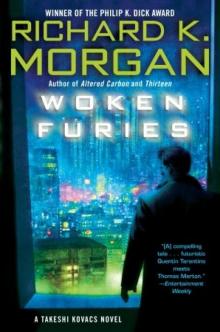 Woken Furies
Woken Furies Altered Carbon
Altered Carbon Broken Angels
Broken Angels Thirteen
Thirteen The Cold Commands
The Cold Commands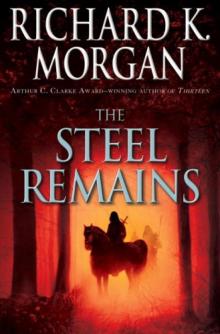 The Steel Remains lffh-1
The Steel Remains lffh-1 Market Forces
Market Forces Altered Carbon tk-1
Altered Carbon tk-1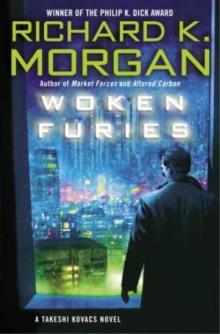 Woken Furies tk-3
Woken Furies tk-3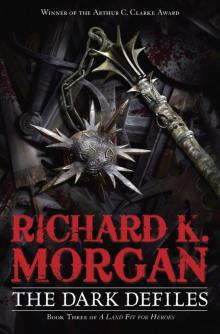 The Dark Defiles
The Dark Defiles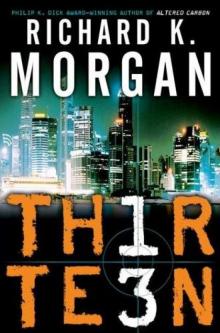 Black Man / Thirteen
Black Man / Thirteen Broken Angels tk-2
Broken Angels tk-2